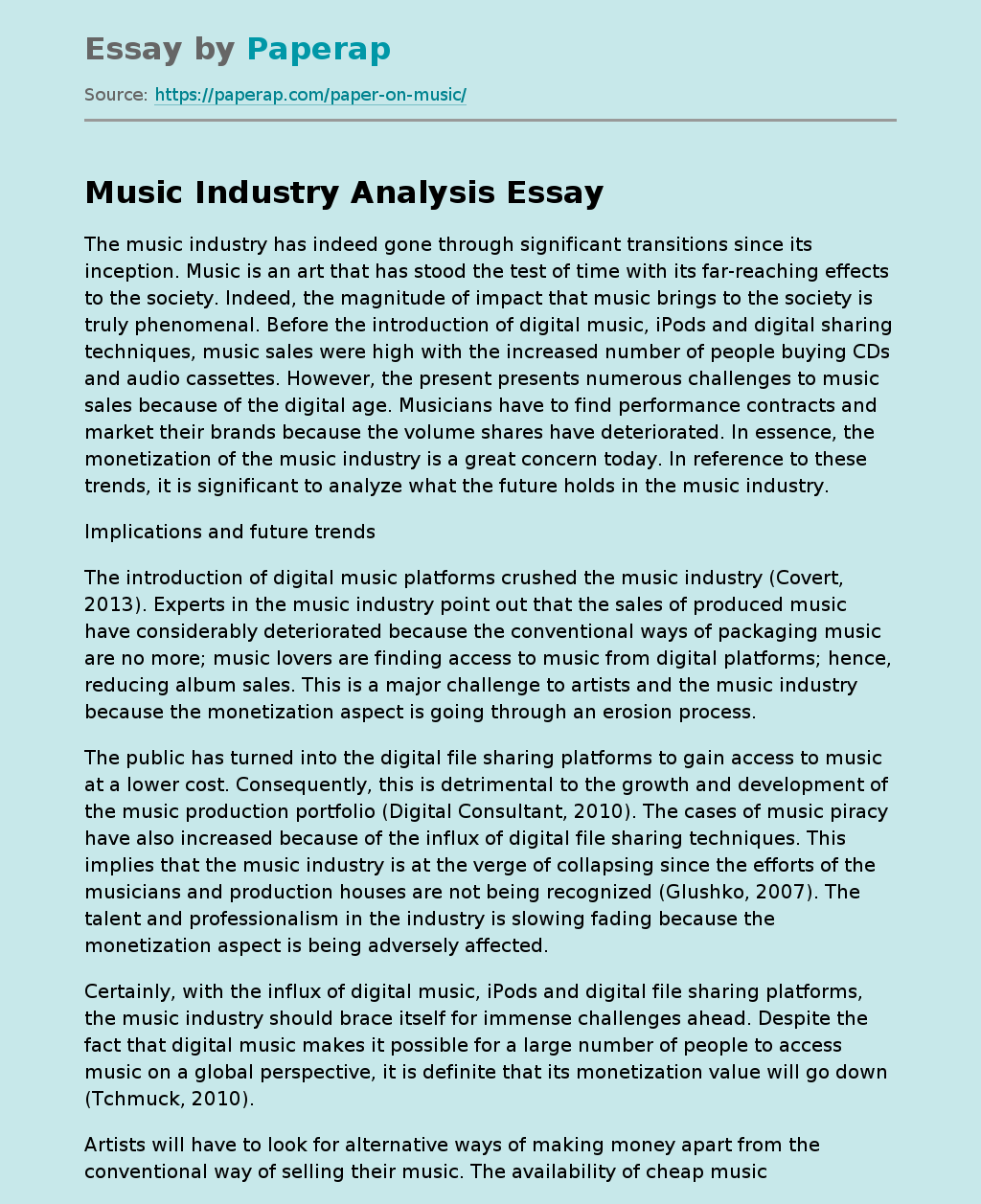Music Industry Analysis
The music industry has indeed gone through significant transitions since its inception. Music is an art that has stood the test of time with its far-reaching effects to the society. Indeed, the magnitude of impact that music brings to the society is truly phenomenal. Before the introduction of digital music, iPods and digital sharing techniques, music sales were high with the increased number of people buying CDs and audio cassettes. However, the present presents numerous challenges to music sales because of the digital age.
Musicians have to find performance contracts and market their brands because the volume shares have deteriorated. In essence, the monetization of the music industry is a great concern today. In reference to these trends, it is significant to analyze what the future holds in the music industry.
Implications and future trends
The introduction of digital music platforms crushed the music industry (Covert, 2013). Experts in the music industry point out that the sales of produced music have considerably deteriorated because the conventional ways of packaging music are no more; music lovers are finding access to music from digital platforms; hence, reducing album sales.
This is a major challenge to artists and the music industry because the monetization aspect is going through an erosion process.
The public has turned into the digital file sharing platforms to gain access to music at a lower cost. Consequently, this is detrimental to the growth and development of the music production portfolio (Digital Consultant, 2010). The cases of music piracy have also increased because of the influx of digital file sharing techniques.
This implies that the music industry is at the verge of collapsing since the efforts of the musicians and production houses are not being recognized (Glushko, 2007). The talent and professionalism in the industry is slowing fading because the monetization aspect is being adversely affected.
Certainly, with the influx of digital music, iPods and digital file sharing platforms, the music industry should brace itself for immense challenges ahead. Despite the fact that digital music makes it possible for a large number of people to access music on a global perspective, it is definite that its monetization value will go down (Tchmuck, 2010).
Artists will have to look for alternative ways of making money apart from the conventional way of selling their music. The availability of cheap music online will be a detrimental consequence to the music industry in respect to music sales. This will ultimately affect the growth and development of artists, and by extension, the music industry. Moreover, piracy will continue being a problem in the music industry because there are no strict regulations of preventing the vice (Condon, 2010). Most musicians will continue to struggle because of lack of sufficient monetary breakthrough in the industry.
This trend relates to the Arab World, where many artists struggle to gain recognition and following. Without the viable structuring of the industry, musicians continue to make losses as they seek to expand their music capacities. The influx of digitalized music prevents the artists in the Arab World from increasing their influence in the industry. Without sufficient platforms for selling their music, they are not in a position to grow; hence, affecting their talent development (Condon, 2010). Without the motivation of sales from their music, it is not easy for the artists to generate the required capacity to grow, and be discovered.
Conclusion
In conclusion, it is evidently clear that music is an important art in the society, and it needs the right structures for it to grow and demonstrate its robust nature. The music industry is under threat from the innovation that technology brings; the volume sales of music are going down with every passing day. It is significant for the relevant stakeholders in the industry to put in place, concerted efforts to address the problem.
References
- Covert, A. (2013). A decade of iTunes singles killed the music industry.
- Condon, H. (2010). Piracy and the effects it has on the Music Industry in relation to Intellectual Property Law.
Music Industry Analysis. (2018, Mar 29). Retrieved from https://paperap.com/paper-on-music/

